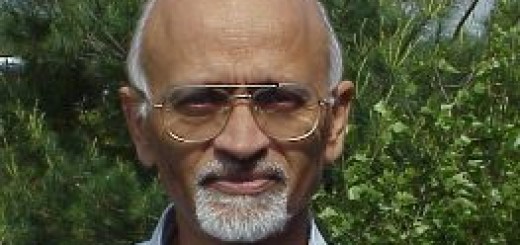Lord, that I may see!

Pope Francis has been speaking a lot about the Blind Man Barthimaeus crying out to Jesus: “Lord that I may see” until he got his eye sight restored, see report published on this CCV page.
It occurred to an old man feeling similarly blind intellectually and psychologically and went to church on his 60th birthday to get some light. The gospel reading that day was on this blind man. His example got latched on to his mind like a leach, gave him many sleepless nights and worked an unbelievable revolution in him. To know what revolution was read the following.
dr. james kottoor
A blind man may not be able to see the difference between black and white, red and blue, green and yellow, but he may very well tell the difference between right and wrong, which we who are supposed to be clear sighted may never, not only often, succeed to discover.
A clear example that loudly proclaims this paradoxical truth is that of Bartimaeus, the blind beggar of Jericho sitting at the wayside [Mk.10.46-52]. Even without the use of his physical eyes he saw Jesus and shouted: “Son of David have pity on me.” What he heard was that “Jesus of Nazareth” was passing by, but what he shouted out was his messianic title: “Son of David”. He was blind but clearly saw – was he blindly seeing? – the paradoxical truth of the divine in the human – his messianic mission.
But the disciples and the people crowding around Jesus and leading his way to Jerusalem were more blind than the beggar when they scolded him to keep quiet. It means that physical proximity or being in the company of Jesus, the Light of the world, is no guarantee at all of being enlightened by His light. The blind beggar sitting far away could see that those who told him to keep quiet, though physically clear-visioned were really blind to what was right for him to do and so he shouted all the louder: “Son of David…” And what did Jesus do? He simply dumbfounded his overzealous trail blazers by telling them to stop scolding, instead to bring the blind beggar to himself and vindicated his shouting by restoring his eyesight in response to his prayer: “Lord that I may see.”
Led by Worldly Light?
This example should prompt all of us, especially those of us who think they know and see, those of us who feel themselves to be the proclaimed followers or messengers of Jesus, those of us who are convinced that they are to be in the vanguard as His appointed spokesmen, to do a real soul searching and to find out whether they are always enlightened by this true “light of the world” or rather by some other ‘worldly’ lights.
A prayerful meditation on this gospel passage years ago, prompted this scribe to do just that. It led him to the humiliating discovery that he was more blind than Bartimaeus, that the only thing he knew for certain was that he did not know and that applied to everything in this world and in the next. Wanted to know, but didn’t know; wanted to see the complete picture of right and wrong, but couldn’t see. So he even wished his eyes were blind like those of Bartimaeus and his mind clear sighted like his.
As a result he too was prompted like him to pray: “Son of David have pity on me; Lord that I may see; Make me see O Lord.” He must have said it thousands of times. And during one of those prayerful groping in the dark, suddenly a soul stirring and meaningful new prayer flashed into his mind. That happened during one of the regular family prayer at night. When that happened he almost said: Eureka, because he knew he was not composing any prayer but asking for light and so the inspiring words were an insight given from above and so he wrote down those words immediately after the family prayer, lest those logical string of words escape his memory, The words that flowed into his mind were the following:
Lord, that I may See!
Lord, that I may see today all that You want me to see, and Only what you want me to see today;
Lord, that I may desire today all that You want me to desire and Only what you want me to desire today;
Lord, that I may think today all that You want me to think, and Only what you want me to think today;
Lord, that I may listen today all that You want me to listen, and Only what you want me to listen today;
Lord, that I may speak today all that You want me to speak, and Only what you want me to speak today;
Lord, that I may do today all that You want me to do, and Only what you want me to do today;
Lord, that I may be fully docile to Your guidance in seeing, desiring, thinking, listening, speaking and doing all through this day. Amen.
This prayer now on paper was both an achievement and gift in that it was the most eloquent verbalization of all what his soul longed for. Trying to imitate Bartimaeus helped him at least to hit on a rightly worded prayer to enable him handle the Himalayan problems of ignorance and blindness troubling him. This prayer remained a sort of secret, selfish affair between him and his God for quite some time. Then it suddenly dawned on him that after all it was also a good prayer not only for his personal use but also for his family. When it thus shifted from a selfish need to a family need, the prayer in the singular: ‘Lord that I may see’, got changed to the plural: ‘Lord that we may see.” For years, it is now the daily prayer of his family.
Six Logical Steps
See, desire, think, listen, speak and do are the six normal logical steps of any human behavior. Perception is the beginning of any purposeful human activity. One who is blind physically, mentally and spiritually can only grope in the dark.
So the first thing needed is enlightenment: “Lord that I may see!”, because man goes where his mind goes. What one sees as true, good, beautiful, holy and joyful draws and attracts one to it like a magnet. Truth is a trap and no one falls in love with an unseen beauty. Equally one is repelled by what is untrue or ugly.
Secondly if the vision is good and beautiful, the attraction transforms itself into a meaningful and irresistible desire. One who is thus caught in the undercurrent of a desire gets absorbed by the object seen irrespective of the surroundings. Desire provides a vice like grip and magnetic pull towards the object seen.
The third step in the logical process is thought. You think often of what your mind has seen and your heart has desired as true, good, beautiful and worth striving after. “Your heart is where your treasure is”[Lk.13.34]. Just think of the daydreaming indulged in by lovers!
The fourth step is listening of the soul to the dialogue between mind and heart, reason and emotion on the pros and cons of the object seen and attracted to. This is listening to the voice of conscience which gets further refined when one listens also to wise counsels of well wishers coming as Vox populi, vox Dei (voice of the people is voice of God). It thus becomes listening to the voice of God speaking through the signs of the times, that is, happenings within one’s self and without.
Fifthly, once your mind and heart are irresistibly drawn towards something precious, you never stop speaking about it. “Out of the abundance of your heart the mouth speaks.”[Mat.12.34] The machine called mind is installed in every one to churn out chains and chains of thought especially on what you hold dear and they come out as words.
Sixth and finally the courage of your convictions spurs you to put your best foot forward and to do all you can to achieve what you desire, think and speak about as worth achieving. Clear vision and earnest desire drive one to constructive action.
Meant for the ‘Know-nots’
This prayer is not meant for those who think they know. Instead: 1. It is meant for those who think they don’t know, especially for those who think that the only thing they know for certain is that they don’t know. 2. It is one of the most unselfish prayers containing all the ingredients needed to bring about the well being of the whole world – Loka Samasta Sukino Bavandu. 3. It is a panacea to wipe out any and every kind of conflicts and quarrels that may rear their ugly heads in a family, community or country. 4. It is a prayer just for today. 5.One who looks to this prayer as the fountain head of all his inspirations, aspirations and endeavours is sure to reach his God-willed destiny in life unmistakably
Four Categories of People
1. Yes, this prayer is not for the self-styled learned. Lady Burton’s classification of people into four categories will perhaps explain it better: “1. He who knows not and knows not he knows not; he is a fool – shun him; 2. He who knows not and knows he knows not; he is simple – teach him; 3. He who knows and knows not he knows; he is asleep – wake him; 4. He who knows and knows he knows; he is wise – follow him.” This fourth group of people may be very rare and hard to find. The great majority may fall into the second group. This is prayer is meant for such people.
2. It is called the most unselfish prayer because at every step and stage – seeing, desiring, thinking, listening, speaking and doing – God’s will and that will alone is given pride of place and sought after. Thy will be done, not My will or Our will. And God wants the whole world to live in peace and harmony, helping, serving and supporting each other and hurting none.
Panacea for Peace
3. As a result it is bound to be a panacea for peace, for wiping out all kinds of tensions and conflicts in the family, community or country. A community is different from a crowd in that the former has one mind while the latter has many heads. Discord erupts in a community or country when its members or citizens fail to see eye to eye. What is good for a community at a given point of time may be disputed. But if everyone decided to seek what God wants that community to do at that given point of time, there can be no dispute or discord. If the community happens to be still locked in two conflicting views, then it is certain that one of the conflicting factions is evidently in the wrong and not seeking God’s will or what is humane and rational. In such an extreme situation what is required of the conflicting parties is to pray for each other till they reach unity of vision and desist from any action detrimental to the interests of the other.
4. This is a prayer just for the day. “Do not worry about tomorrow; tomorrow will take care of itself. Each day has enough trouble of its own.”(Mt.6.34) It is more than what one can possibly handle well at a time. To the extent we fill our todays with tomorrows to that extent we leave today’s job undone. To such people today becomes the tomorrow of which they worried about yesterday. Yesterday is an empty dream which has slipped out of our grip and gone forever, and tomorrow, only just an unsure possibility, which by no means can be reached by our own strength. We may never reach that tomorrow at all. So what matters is today and today alone, the only living reality.
God-centred Prayer
5. Finally the one who is able to make this prayer his soul-force, or his heartfelt yearning flowing out of his convictions, can hardly go wrong, since he is totally God-centred. In his case the Gospel admonition: “Set your hearts on his kingdom first, and on his righteousness, and all these things will be given to you as well”[Mat.6.33], will always ring true. In fact what is said of a motorbike in a TV ad may be more apt to drive home the message: “Pour it, shut it, and forget it,” meaning, fill anyone with the spirit of this prayer, shut him off from the influence of any other spirit and you can simply forget about him, as he is sure to dart like a guided missile and reach his God appointed target.
After experimenting with this prayer for the past several years, this writer feels that this is the only prayer he would like to say for others, and this is also the only prayer he would like others to say for him.
Like the five blind men
These rambling thoughts on a newly discovered prayer need not upset the mental equilibrium of any of the readers, as they happen to be only the views of one who knows he knows not, of one who is more blind than Bartimaeus. In fact it may be more apt to liken these views to those of the five blind men describing the elephant. They were all hundred percent honest and yet hundred percent wrong or incomplete. Still there is nothing wrong in trying to digest these incomplete ideas honestly presented because God can speak even through the mouth of an ass. And according to the scriptures, He chooses the foolish and the ignorant to confront the wise; the weak and the contemptible to confound the strong; the poor and the blind to shake up the rich and the clear sighted[Cor.1.27].
Thus, it is only when we transcend all accepted human standards the profundity of God’s grace and greatness are made manifest. Lord that I may see… Lord that the readers of this piece may see, desire, think, listen, speak and do all what You want and only what You want them to do. Amen.
It may be proper to add a note of self-criticism. The first question that comes up to my mind is this: You are leaping for the moon, trying for the humanly impossible and ordering to comprehend the infinite with the finite. It doesn’t need a Solomon to understand that to aim at capturing All that the Lord wants and Only what the Lord wants on six counts is doomed to fail at the very outset. So shouldn’t you propose something more practical and within the reach of ordinary humans?
Rationally speaking this criticism is very legitimate. But the truth of the matter is that humans have an unlimited, if not infinite, capacity to achieve and improve and we never realize the stupendous heights we can reach until we try without giving up. Hence the exhortation: Hitch your wagon to the stars! And what should dumbfound all critics would be the clarion call of the Master himself: humans? Against that prescription the things sought after in this prayer should fade into insignificance Be you perfect as your heavenly Father if perfect. A possible target for!
Contact at: jameskottoor@gmail.com

















